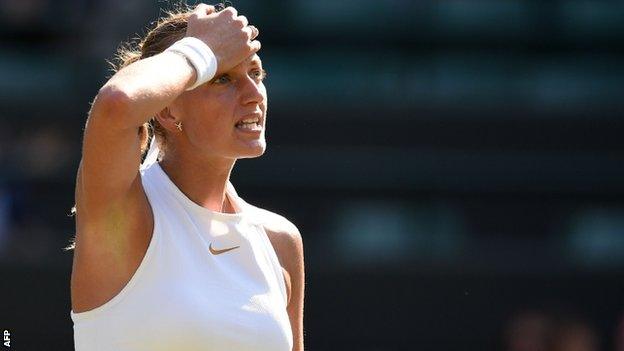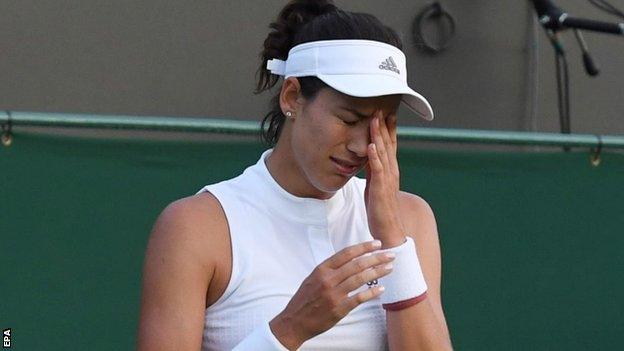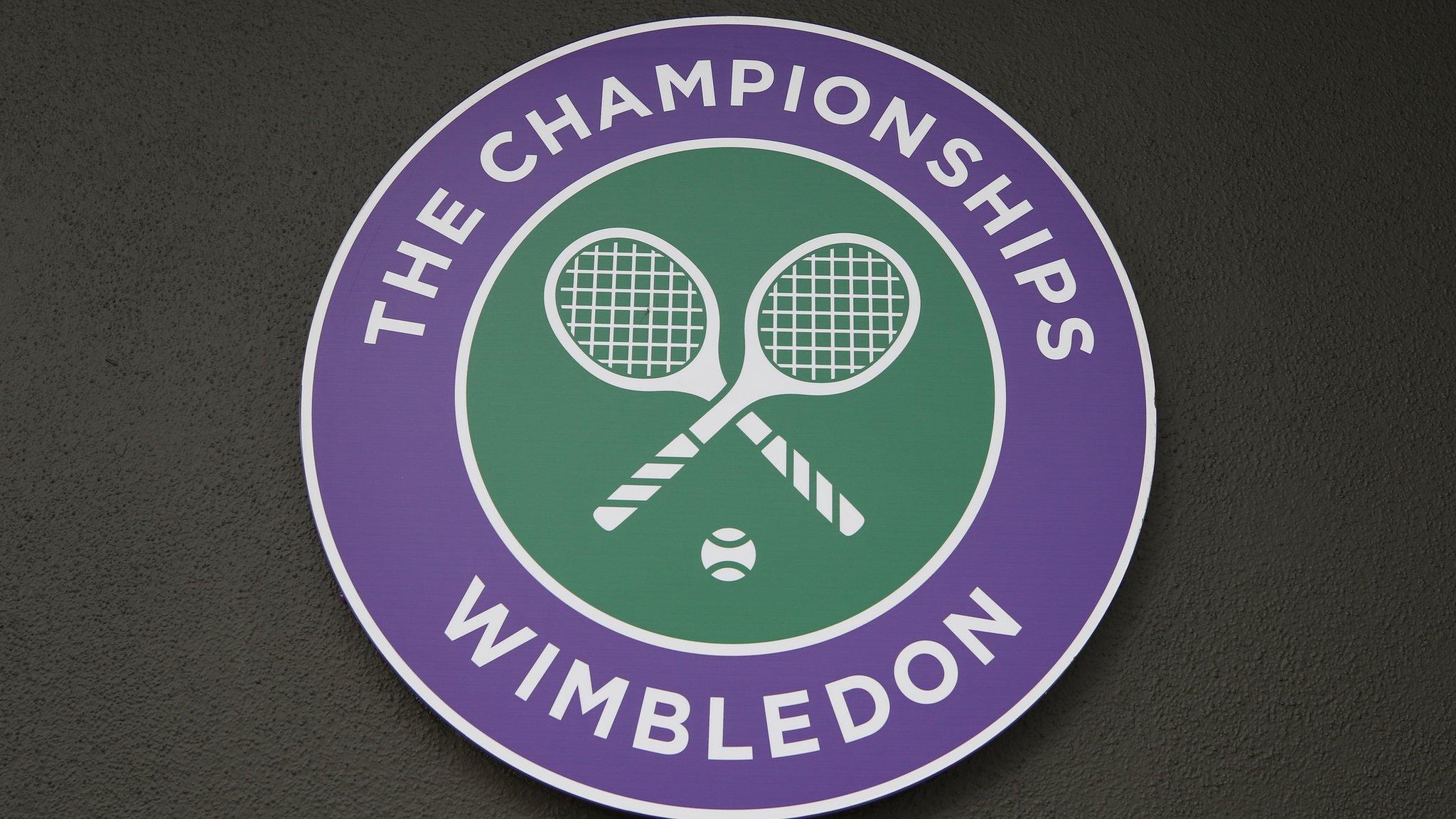Wimbledon 2018: Why are so many seeds out already?
- Published

Two-time champion Petra Kvitova, among the favourites for the title, is one of the 14 women's seeds to have been knocked out in the first two rounds
Wimbledon 2018 on the BBC |
|---|
Venue: All England Club, Wimbledon Dates: 2-15 July |
Coverage: Watch live on BBC TV, BBC iPlayer, BBC Red Button, Connected TVs and the BBC Sport website and app; Live Radio 5 live and 5 live sports extra commentary; Text commentary online. |
It's only the third round at Wimbledon and already there is only one of the top 10 seeds left in the women's draw.
This is a record for the Open era - since tennis went professional in 1968 - because until now at least four of the top 10 seeds had always reached the fourth round.
Seventh seed Karolina Pliskova is still in the draw but a total of 14 women's and 16 men's seeds had made exits from the All England Club by the end of the second round.
The numbers got worse on Friday with ninth seed Venus Williams and 10th seed Madison Keys losing their third-round matches. And Pliskova was in danger of joining them, having to fight back from a set and a break down to beat Mihaela Buzarnescu.
And then on Saturday world number one Simona Halep was knocked out by Hsieh Su-wei.
In the men's draw, 16 seeds got through to the third round, which is the lowest number since 2003 when there were 15.
There are 32 seeds in each draw, which means that if results went according to seedings then they would be the only players left in the third round when the field has been whittled down from 128 to 32.
Of course there are always upsets so this has never happened since Wimbledon introduced 32 seeds instead of 16 in 2001. This is a particularly bad year for those expected - on paper- to go further in the tournament.
BBC Sport looks at some of the possible reasons why so many seeds have fallen early.
'False' rankings
When players come back after injury they have fallen down the rankings, which is how sixth seed Grigor Dimitrov came to be facing three-time Grand Slam champion Stan Wawrinka in the first round.
The Swiss former world number three, now ranked 224 in the world after a knee injury, beat the Bulgarian in four sets in what could hardly be called a shock upset.
Dimitrov said Wawrinka had deserved to win but facing him at this early stage had been a "tough pill to swallow".
Similarly, British 22nd seed Johanna Konta had bad luck to be facing former Australian Open finalist Dominika Cibulkova in the second round.
The Slovak would have been seeded if the All England Club had not elevated Serena Williams to the seedings when her world ranking would have kept her out after time out of the game to have a baby.
The way the draw works means that the earliest two seeded players can meet is in the third round.
Mindset

Garbine Muguruza had title thoughts on her mind
When defending champion Garbine Muguruza lost to world number 47 Belgian Alison van Uytvanck in the second round on Thursday, she had covered her face as if to compose herself towards the end of the match.
Wanting to win it again seemed to weigh her down as she made the earliest exit of a defending women's champion since Steffi Graf in 1994.
"I mean it's always on your mind, of course," the Venezuela-born Spaniard said after her exit. "I wasn't thinking really I have to defend anything, I was just thinking to go and win again. I changed a little bit the mindset."
Another favourite for the women's title, two-time champion Petra Kvitova spoke of nerves after her first-round defeat by Aliaksandra Sasnovich.
"I probably didn't really have a clear mind. I was kind of thinking a little bit too much than I should," she said. "The nerves were there again. I just tried to kind of fight with myself - [it was] probably was the biggest opponent which I have."
And Madison Keys, who lost to Russian qualifier Evgeniya Rodina in the third round on Friday, said she had had "a massive mishandle of nerves" because she was aware she could face Serena Williams next.
"I think that kept being in the back of my mind," she said "I don't think I did a good job of keeping in the moment and playing the person who was in front of me.
Which top-10 seeds are out of Wimbledon already? | |
|---|---|
Women: | Simon Halep (1), Caroline Wozniacki (2), Garbine Muguruza (3), Sloane Stephens (4), Elina Svitolina (5), Caroline Garcia (6), Petra Kvitova (8), Venus Williams (9), Madison Keys (10) |
Men: | Marin Cilic (3), Grigor Dimitrov (6), Dominic Thiem (7), David Goffin (10) |
Nature
Wimbledon 2018: Caroline Wozniacki attacked by flying ants on court
At what has been a very hot and sunny Wimbledon this year, there was one day where the rain came and men's third seed Marin Cilic paid the price of the disruption.
The Croat had gone two sets up on Wednesday evening against Guido Pella before rain twice interrupted play but had gone a break down in the third when the match was suspended. When they resumed on Thursday, the Argentine said the "rain had helped" him to a stunning five-set victory.
"It was a little bit unfortunate to stop last night when I was break down," said Cilic, who was runner-up here to Roger Federer last year. "And also when we came back the court was also very slippery."
Meanwhile, Wozniacki came up against a different problem with nature in her defeat, having to ask the umpire for insect repellent to deal with flying ants.
"It was definitely a first for me here," she said.
Fatigue?
After seventh seed Dominic Thiem retired from his first-round match against Marcos Baghdatis when trailing 6-4 7-5 2-0, he said he should not have played in the Halle grass-court event.
"It was a big mistake," he said. "[Rafael] Nadal also pulled back from Queen's, I should have done the same. I will learn from that for the future."
World number one Nadal did not play any grass warm-up events and when he arrived at Wimbledon he had not played any matches since claiming his record-extending 11th French Open title.
Eight-time Wimbledon champion Federer, meanwhile, skipped the entire clay-court season to be ready for the grass.
Kvitova and Wozniacki had both won grass-court titles in the run-up to Wimbledon, with the Czech triumphing at Birmingham and the Dane at Eastbourne.
"I'm really looking for some time off right now," Kvitova said after her first-round defeat. "I have lot of tennis so far in my hands and on my legs."
Should we even care about seedings?

"I think this Wimbledon is another demonstration of how seeding is not the be all, end all," Konta said.
"The depth we have in the women's game, how players can play very well in any certain match."
While many seeds have tumbled, the genuine big-name global stars are still here.
Federer, Nadal, 12-time Grand Slam champion Novak Djokovic, and 23-time Grand Slam champion Serena Williams have been in commanding form in their matches so far.
Particularly in the case of Djokovic and Williams, their names are much bigger than their seedings of 12 and 25 respectively.
Grand Slams intend to revert to 16 seeds instead of 32 from 2019, which means the leading players could meet a top-20 player as early as the first round.
- Published11 July 2018
